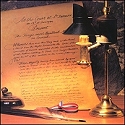 July 21, 1861
July 21, 1861
Disguised as a man, Sarah Emma Edmonds of Magaguadavic, serves on the Union side in the "Battle of Bull Run" during the American Civil War. Under the alias of Private Franklin Thompson, she becomes a soldier nurse and later a Union spy.
July 21, 1881
At the first National Acadian Convention taking place in Memramcook, the Feast of Assumption (August 15) is chosen as National Acadian Day - affirming the uniqueness of Acadian culture as descending not from Canada, but from France.
July 22, 1941
Ron Turcotte, jockey and horse racing triple-crown winner, is born in Drummond.
July 23, 1868
The Honourable Lemuel Allan Wilmot, of Fredericton, is appointed New Brunswick's first native-born Lieutenant-Governor.
July 23, 1914
New Brunswick's worst labour strife occurs during the Saint John Street Railwaymen's strike, when militant union and supporters clash in the streets against the Royal Canadian Dragoons.
July 23, 1924
The Petitcodiac Tidal Power Company attempts to convince federal authorities to allow the construction of a dam across the Petitcodiac River between Hopewell Cape and Fort Folly Point.
July 23, 1971
Antonine Maillet's "La Sagouine" (The Washerwoman), the internationally acclaimed "quintessential Acadian play in language, humour and content", is officially launched at the Université de Moncton, with Viola Léger.
July 24, 1803
Colonel James Peters, of Queens County, writes to Edward Winslow in Fredericton of his great success at growing hemp for rope along the rich intervale lands of the river St. John.
July 24, 1904
The first Canadian branch of the "Société Mutelle d'Assomption" is established in Bouctouche under the leadership of Dr. David-V. Landry. Founded in Waltham (Massachusetts) in 1903, the international headquarters is moved to Moncton in 1917.
July 24, 1911
The first conference of francophone educators takes place at Saint-Louis-de-Kent.
July 24, 1915
The oldest man in the Dominion of Canada is reported living at Red Rock, near St. George. At 114 years of age, James McKelvie claims that living near the Bay of Fundy has helped his longevity.
July 25, 1849
Opening of the lazaretto in Tracadie. The leper facility struggles until June 11, 1867, when the House of Assembly authorizes the Board of Health to place the facility under the care of the Religious Hospitalliers of Saint Joseph.
July 25, 1883
While carrying a load of timber from Quebec to London (England), New Brunswick's pride, the clipper ship "Marco Polo", runs aground in a storm and breaks up off the coast of Cavendish (Prince Edward Island).
July 25, 1952
It is announced that the largest military training base in Canada will be established in the area between Upper Gagetown and Westfield. Encompassing 1,106 sq km, an estimated 1,100 families will be moved in a mass migration.
July 26, 2024
FEAST DAY OF SAINT ANNE
July 26, 1785
Sunbury County is re-established as a county within the new province of New Brunswick, with Burton as the Shire Town.
July 26, 1834
Andrew Flemming receives the first mining license in New Brunswick, to mine coal at Long Creek Point near Minto.
July 27, 1606
Marc Lescarbot, North America's first historian, arrives at Port Royal (Nova Scotia). The following spring, he visits the river St. John and Saint Croix island, returning to France in 1607, where he publishes his vast "History of New France".
July 27, 1721
Following the signing of the Treaty of Utrecht between France and England, eastern First Nations (including Mi’kmaq, Maliseet and Passamaquoddy) protest: “My land is not thine either by right or conquest, or by grant or by purchase”.
July 27, 1812
At Saint John, the owners of the sloop "General Smyth" apply for a letter of marque to cruise against the American enemy. While no letters are issued, the vessel engages in privateering anyway during the War of 1812.
July 27, 1926
Construction begins on Moncton's first synagogue. Tiferes Isreal Synagogue later opens its doors on Steadman Street.
July 27, 1949
Brothers Rufus and George Hamilton are hanged in Fredericton for the murder of taxi driver Norman Burgoyne. Despite the early hour of 2 a.m., more than 1,000 people turn out to witness the hanging.
|